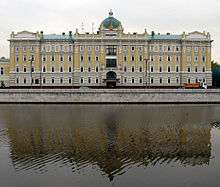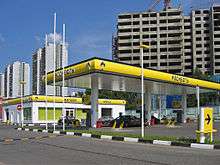Rosneft
 | |
 Rosneft Headquarters, Sofiyskaya Embankment, Moscow | |
| Public (OAO) | |
| Traded as |
MCX: ROSN LSE: ROSN |
| Industry | Oil and gas |
| Founded | 1993 |
| Headquarters | Moscow, Russia |
Key people |
Igor Sechin (CEO) Alexander Nekipelov(Chairman) |
| Products |
Petroleum Natural gas Motor fuels Petrochemicals |
| Revenue |
|
|
| |
| Owner |
Russian government (69.5%) BP (19.75%) |
Number of employees | 106,000(2014)[1] |
| Parent | Rosneftegaz |
| Website |
www |
Rosneft (Russian: Росне́фть, IPA: [rɐˈsʲnʲefʲtʲ]) is an integrated oil company majority owned by the Government of Russia. Rosneft is headquartered in Moscow's Balchug district near the Kremlin, across the Moskva River. Rosneft became Russia's leading extraction and refinement company after purchasing assets of former oil giant Yukos at state-run auctions. In March 2013, Rosneft became the largest publicly traded oil company, after buying TNK-BP.[2][3]
Overview
Rosneft conducts oil and gas exploration and production activities on Sakhalin island, Siberia, Timan-Pechora field and in southern Russia, including Chechnya. It owns and operates two refineries. The refinery in Tuapse, on the Black Sea, focuses on refining high-gravity oil from western Siberia. Another plant in Komsomolsk-on-Amur is the easternmost refinery in Russia. The Komsomolsk Refinery benefits from its technological integration with Nakhodkanefteprodukt, while the Tuapse Refinery is noted for its favorable location on the Black Sea coast and is part of an integrated complex with Tuapsenefteprodukt. Rosneft operates shipping (Arkhangelsknefteprodukt), pipeline and marketing companies. As of 29 December 2006, the company's market value was US$83.908 billion.[4] Rosneft net income fell 20% for the first quarter of 2009 from $2.56 billion to $2.06 billion due to the weakness of oil price.[5] Rosneft is 75.16% owned by the Russian state, BP a British multinational oil and gas company headquartered in London, England, United Kingdom owns a 19.75% stake while around 5% of the shares are in free float.[6]
History
Origin
Rosneft was established in 1993 as a unitary enterprise with assets previously held by Rosneftegaz, the successor to the Soviet Union's Ministry of Oil and Gas. During the early 1990s almost all Russian oil companies and refineries were extracted from Rosneft to form ten integrated companies. Later their number was halved as a result of acquisitions. On 29 September 1995, an Order of the Government of Russia №971 transformed Rosneft into an open joint stock company. In October 1998, the Russian government appointed Sergey Bogdanchikov as president. The company owned two obsolete refineries and several low-productive and poorly managed oil-producing assets. In the late 1990s, plans for Rosneft's privatization in Russia were made, but due to competition with equally influential pretenders they were not carried out. In 2001, the company became Russia's official representative on projects with production sharing agreements. In 2003, Rosneft began oil production at the Aday block in the Atyrau Region near the Caspian Sea in Western Kazakhstan. In 2004 Rosneft had increased oil output from 98.56 million bbl (13.47 million tonnes) in 2001 to 148.26 million bbl (20.27 million tonnes). In the same year Rosneft agreed to merge with Gazprom but plans were discarded in May 2005. It is alleged that Bogdanchikov did not wish to take a lesser role in the integrated company answering to Gazprom CEO Alexei Miller.
Yukos auctions, 2004 and 2007

Starting in 2004, the Russian government organized a series of auctions to sell oil giant's Yukos assets, of which Rosneft won the majority. On 22 December 2004, Rosneft had purchased a then little known Russian oil company called Baikal Finance Group. Three days earlier, the previously unheard-of Baikal Group had purchased Yukos main asset Yuganskneftegaz (Yugansk) at a state-run auction for 9.35 billion dollars (6.9 billion euros), supposedly to satisfy tax debts. Many viewed this as a de facto nationalization of Yugansk. Andrei Illarionov, then a senior Putin economic advisor, denounced it as "the scam of the year".[7] With the addition of Yungansk Rosneft became Russia's second-largest producer of oil and gas by 2005, with an average output of 1.69 million bpd.
In March 2007 Rosneft had announced it hoped to increase production from 80 million tonnes in 2006 to 103 million tonnes by the end of 2007, wanted to extract 140 million tonnes of oil by 2012 and become a global top three energy company.[8] In June 2007, Rosneft paid $731 million for the transportation assets of Yukos, which had declared bankrupt in August 2006 after three years of litigation over tax arrears.[9] In August 2007 Bogdanchikov said that although the Yukos acquisitions had increased Rosnefts debt to $US 26 billion, he planned to reduce debt to 30% of total assets by 2010 by tripling refining capacity and expand into China.[10]
2006 IPO
On 14 July 2006, Rosneft conducted one of the largest initial public offerings in financial history, after placing nearly 15% of its shares on the Russian Trading System and the London Stock Exchange. The offering raised USD 10.7 billion. Shares were priced at $7.55, resulting in Rosneft being valued at $79.8 billion. Rosneft achieved its objective largely by arranging bilateral deals with strategic investors, such as British Petroleum, Petronas and CNPC, which bought almost $2.6 billion worth of shares during the IPO. Three oligarchs invested over $1 billion each on the LSE, namely Roman Abramovich, Vladimir Lisin, and Oleg Deripaska. Critics of the deal included financier George Soros, who called on investors to boycott it on ethical grounds, and Andrei Illarionov, who called the deal illegal and "a crime against the Russian people," because none of the proceeds would go into the state budget. The British Financial Services Authority authorised the flotation of Rosneft shares despite an appeal from Yukos, saying that to allow the Rosneft IPO would be tantamount to facilitating the sale of stolen goods.
Arctic shelf deals with BP and ExxonMobil

On 15 January 2011, Rosneft and British Petroleum (BP) announced a deal to develop the East-Prinovozemelsky field on the Russian arctic shelf between the Yamal Peninsula and Novaya Zemlya island.[11] As part of the deal Rosneft was to receive 5% of BP's shares, worth approximately $7.8 billion, as of January 2011 and BP would get approximately 9.5% of Rosneft's shares in exchange.[12] According to the deal, the two companies would create an Arctic technology centre in Russia to develop technologies and engineering practices for safe arctic hydrocarbons extraction.[13] AAR, which represents four billionaires of Russian origin and is BP's Russian partner in the TNK-BP joint venture, blocked the BP–Rosneft deal in international courts, arguing it breached earlier contracts between BP and AAR.[14][15] The TNK-BP partners had previously signed a shareholding agreement which stipulated that their Russian joint venture would be the primary corporate vehicle for BP's oil and gas operations in Russia.[16] On 30 August 2011, Rosneft announced that instead of BP the partner for EPNZ-1, EPNZ-2 and EPNZ-3 in the Kara Sea will be ExxonMobil. In exchange, subject to approval by U.S. regulators, in addition to a share in oil production in Russian fields, Rosneft was granted participation in U.S. fields in Texas and the Gulf of Mexico.[17][18]
Black sea shelf deal with ExxonMobil
On 27 January 2011, Rosneft and the American company ExxonMobil signed a deal to establish a joint venture for the purpose of prospecting and extracting oil from the Tuapse field deepwater area on the Black Sea shelf, near the coast of the Krasnodar Krai. The value of the deal is unknown, but ExxonMobil is expected to invest $1 billion in the project. The venture will be shared 50–50 between the companies during prospecting phase, and 2/3 – 1/3 in Rosneft's favour during the extraction phase. The Tuapse Trough is estimated to contain 7.2 billion barrels of oil equivalent. The first well could be drilled in 2012.[19] The deal also contains options for additional cooperation, such as extended exploration and production, deliveries to Rosneft's oil refinery in Tuapse, development of transport infrastructure and research on offshore oil production technologies.[20] According to analysts, offshore areas are central to Rosneft's expansionist plans, and the company is looking for foreign cooperation to bring in new technology and share risks.[19]
TNK-BP acquisition
On 22 October 2012, it was announced that Rosneft will take over TNK-BP International, a parent company of TNK-BP Holding, which is the third largest oil company in Russia.[21] BP will receive in exchange of its stake $12.3 billion of cash and 18.5% of Rosneft's share, while ARR will receive $28 billion in cash.[22] According to Rosneft's CEO Igor Sechin, no discussion had been held on a buyout of minority shareholders in TNK-BP Holding.[23] The deal was completed on 20 March 2013.[2][3]
Government share sale
In August 2014, it was announced that preparations by the Russian government to sell a 19.5 percent stake in the company were underway and would most likely be sold in two tranches.[24]
Management

As of December 2006, notable members of the Rosneft Board of Directors consisted of:
- Igor Sechin (Chairman)
- Sergey Bogdanchikov (President of Rosneft)[25]
- Matthias Warnig, former member of the East German State security forces (STASI)[26]
- John J. Mack (2013–2014), formerly Morgan Stanley[27]
See also
References
- ↑ OJSC Rosneft Oil Company. "Top 20 Largest Oil & Gas Employers". Retrieved 11 April 2016.
- 1 2 "Rosneft finalizes TNK-BP deal, becomes world's largest oil producer". RT. 21 March 2013. Archived from the original on 29 April 2014. Retrieved 25 March 2013.
- 1 2 Soldatkin, Vladimir; Callus, Andrew (22 March 2013). "Rosneft pays out in historic TNK-BP deal completion". Reuters. Archived from the original on 14 February 2014. Retrieved 25 March 2013.
- ↑ "Capitalization of Russian Stock Market Increases 1.6% on Thursday". Interfax. 29 December 2006. Archived from the original on 5 February 2012. Retrieved 27 August 2007.
- ↑ Clark, Torrey (28 May 2009). Rosneft's Net Income Falls 20% After Oil Prices Tumble (Update2), Bloomberg
- ↑ "Rosneft at a Glance". Rosneft. Archived from the original on 9 February 2014.
- ↑ Moscow News 28 December 2004
- ↑ AFP (9 March 2007). "Russia's Rosneft Aiming to Become Top Global Oil Company". petroleumworld. Elio Ohep Fitzgerald.
- ↑ "Rosneft Gets More of Yukos". Oil & Gas Eurasia. June 2007. Archived from the original on 8 February 2012. Retrieved 27 August 2007.
- ↑ "Rosneft Goes on Absorbing Yukos". Russia Today. 7 August 2007. Archived from the original on 28 February 2008. Retrieved 27 August 2007.
- ↑ "Rosneft Strategic Alliance with BP" (PDF). Rosneft. January 2011. Archived from the original (PDF) on 30 October 2012. Retrieved 30 January 2011.
- ↑ "BP and Russia in Arctic oil deal". BBC News. 14 January 2011. Archived from the original on 2 November 2011.
- ↑ "Rosneft and BP Form Global and Arctic Strategic Alliance". Rosneft. 14 January 2011. Archived from the original on 28 May 2012.
- ↑ "AAR files new suit against BP in bid for $10 bln compensation". Sputniknews. Sputnik. 15 August 2011. Retrieved 29 January 2015.
- ↑ Yenikeyeff, Shamil (23 November 2011). "BP, Russian Billionaires, and the Kremlin: A Power Triangle That Never Was" (PDF). Oxford Energy Comment. The Oxford Institute of Energy Studies: 18. Retrieved 24 November 2011.
- ↑ Flynn, Alexis; Gronholt-Pedersen, Jacob (18 May 2011). "BP, Rosneft Still in Talks". The Wall Street Journal. (subscription required). Archived from the original on 17 May 2013. Retrieved 22 May 2011.
- ↑ "ExxonMobil in $3.2bn Rosneft Arctic pact". Upstream Online. NHST Media Group. 30 August 2011. (subscription required). Archived from the original on 7 October 2012. Retrieved 31 August 2011.
- ↑ Vasilyeva, Nataliya (30 August 2011). "Rosneft Teams Up with Exxon Mobil in Arctic Deal". Associated Press (via Bloomberg Businessweek). Bloomberg. Archived from the original on 2 November 2012. Retrieved 24 October 2012.
- 1 2 Oliphant, Roland (28 January 2011). "Exxon, Rosneft Sink $1Bln in Black Sea". The Moscow Times. Archived from the original on 20 March 2014.
- ↑ "Rosneft and ExxonMobil to Develop Black Sea Resources". Rosneft. 27 January 2011. Archived from the original on 28 May 2012.
- ↑ Taking a stake in Rosneft is a big gamble for BP. The Guardian, October 2012Archived 17 May 2013 at the Wayback Machine.
- ↑ Korsunskaya, Darya; Callus, Andrew (22 October 2012). "Rosneft beefs up with TNK-BP purchase". Reuters. Archived from the original on 22 February 2014. Retrieved 22 October 2012.
- ↑ Lehane, Bill (23 October 2012). "Sechin points to multi-billion TNK-BP synergies". Upstream Online. NHST Media Group. Archived from the original on 1 March 2014. Retrieved 24 October 2012.
- ↑ "Preparations for Rosneft's privatization under way" (Press release). Reuters. 28 August 2014.
- ↑ "Rosneft's Board of Directors". Rosneft. Archived from the original on 9 February 2014. Retrieved 27 August 2007.
- ↑ Deutschlandradio – Startseite.
- ↑ Baer, Justin (29 May 2014). "Mack Leaving Russia's Rosneft Board". Wall Street Journal. Retrieved 6 July 2014.
Further reading
- Stuart D. Goldman (2006) CRS Report for Congress
- Bernard A. Gelb (2006) Russian Oil and Gas Challenges
- Energy Information Administration (EIA). Russia Country Analysis Brief,
- TNK-BP. Kovykta ProjectViewed 28 December 2005
- Mevlut Katik (2003)Blue Stream's Pipeline's Future in Doubt Amid Russian Turkish Pricing Dispute
- Yukos Receives Bill for Nearly $1 billion in Back TaxesOctober 2004
- Gazprom to acquire Yuganskneftegaz buyerDecember 2004
- Rosnef Magazine 2006
- Shamil Yenikeyeff (2011) "BP, Russian billionaires, and the Kremlin: a Power Triangle that never was"
External links
| Wikimedia Commons has media related to Rosneft. |
- Official website (Russian) (English)
- Rosneft Oil production, refining, reserves and capex by division, segment and period (Grmike, wikinvest)
- Yahoo! – OAO Rosneft Oil Company Company Profile
- Rosneft Oil analytics information
- Rosneft ecosystem in Russia (2013)
Rosneft is now 100% controlled by the Russian government as you can see from the company's website